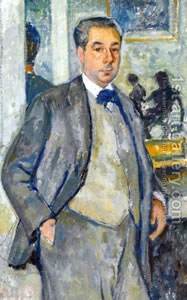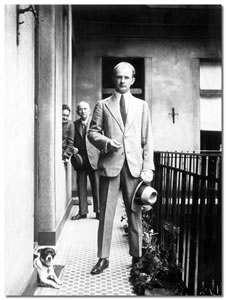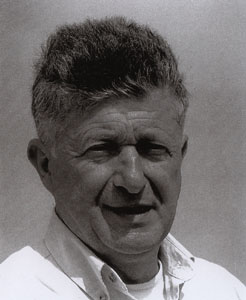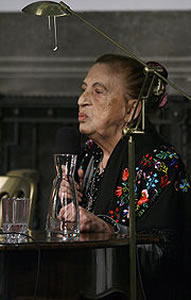De Amerikaanse schrijver Mitch Cullin werd geboren op 23 maart 1968 in Santa Fe, New Mexico. Zie alle tags voor Mitch Cullin op dit blog.
Uit: Cosmology of Bing
„Damn notes, Bing thought. Should’ve kept them in a pocket.
And where had they left off? What was said? He couldn’t recall having even lectured. The syllabuses were passed out, surely. Introductions were made, of course. But today—where to begin? He had no idea.
“Well, let me see. Perhaps I should ask you. I suspect some fledgling astronomers in the room have a few thoughts on how to proceed.”
This was the Thursday class, supposedly the same students as from the Tuesday class, yet Bing found himself standing in front of quiet strangers—sixty-eight blank faces staring at him, slouched bodies occupying seats in the Thompson Planetarium, not a single person worth remembering. But the first weeks always seemed awkward, a required adjustment period while minds were being made up (some students would drop the course, latecomers would appear). And sometimes a month passed before a class formed its own distinct personality—morose, cheerful, maybe chatty—and from that collective one or two promising individuals usually emerged.
“Professor Owen, can I ask a question?”
A young woman’s voice, very deep and loud. But she hadn’t raised her hand. So Bing peered forward, looking for her, and said, “You just did. Ask another if you wish.”
No one smiled or laughed. A tough crowd.
“Stand up please. I don’t know where you are.”
She cleared her throat and then stood, asolitary soul in the back row.
“There you are,” he said.
Yes, there she was. Bleached hair as white as milk, cropped close to her scalp. Black tank top. Fingers fidgeting with the loops of her blue jeans.
“This might be off the subject, but I was wondering if you believed in alien life, as in extraterrestrial beings visiting us. Because I do. I mean, if you consider that we all come from the same source then it doesn’t seem so impossible that equally intelligent beings or even smarter-than-us beings might actually be here from another galaxy. Because when I was fourteen my brother and me actually saw what was obviously an alien craft one night at my grandparents’ house in Virginia. There’s no other explanation, really. So I’m not surprised at all.”
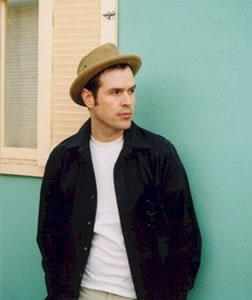
Mitch Cullin (Santa Fe, 23 maart 1968)
De Amerikaanse dichter Gary Joseph Whitehead werd geboren op 23 maart 1965 in Pawtucket, Rhode Island. Zie alle tags voor Gary Whitehead op dit blog.
A Cold House
I wake now to a house as cold
as your side of our double bed.
Across the threshold, in the dark
hall, the thermostat sparks
a blue star, and downstairs
the boiler thumps like a heart
revived. Hot water shrieks
through pipes till registers tick
like clocks toward a time bearable
and close. I dress in wool
and fleece, keep hands in pockets.
On the couch, our dog looks out
the bay window, his breath
on the glass making a bouquet,
gray flowers which bloom and fade.
Full of Blood, and Irrelevant
If memory had fingers, it would wring
from me each forgettable day we shared.
The double-date drive to Plum Island
in the pouring rain, windows fogged
like shower glass. I’d listen now to your
every laugh. That Sunday morning,
March, repairing a botched crossword
while our clothes rolled in the laundromat’s
mechanical song. What shirt were you
wearing? How long was your hair then?
A year in retrospect is a checked list
written in disappearing ink and clutched
in a tight fist. Pick up shampoo. Take out
trash. Replace washer in kitchen sink.
How many hours did we pass together?
Given the chance to do it over, would we
do it the same way? And if memory
did have fingers and those fingers formed
a fist, would our times shine out,
red as rubies, full of blood, and irrelevant?
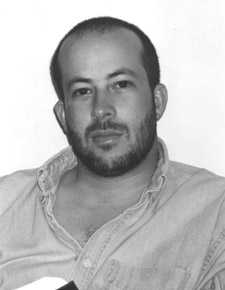
Gary Whitehead (Pawtucket, 23 maart 1965)
De Japanse dichteres en schrijfster Yōko Tawada werd geboren op 23 maart 1960 in Tokyo. Zie alle tags voor Yōko Tawada op dit blog.
Uit: Die Ohrenzeugin (Vertaald door Ilse Utz)
„Neulich rief mich eine Freundin aus Amerika an und fragte mich, warum ich ihr Email nicht beantworte. Ich erzählte ihr vom Absturz meines Computerprogramms. Dann fragte ich sie, was in ihrem Email stand. Sie antwortete: „Da stand, daß dein Fax nicht funktioniert! Ich wollte dir ein Fax schicken, aber das ging nicht!” Ich erzählte ihr, wie mein ehemaliges Fax kaputtging, ich zwar ein neues hatte, mit dem aber nicht umgehen konnte. Nachdem ich den Hörer aufgelegt hatte, fiel mir erst die Frage ein: Was stand aber in ihrem Fax?
…
Whitney erzählte, sie habe gerade ein Email von Aki bekommen. Es sei aber leider unlesbar, man könne nur die ersten zwei Wörter “Liebe Whitney” lesen. “Soll ich ihr ein Email schicken und fragen, was sie dir geschrieben hat?” fragte ich sie. Es gibt ein japanisches Kinderlied, das etwa so geht: Eine schwarze Ziege bekommt einen Brief von einer weißen Ziege und frißt ihn ungelesen auf. Dann bereut sie es aber und schreibt der weißen Ziege einen Brief und fragt, was in dem ersten Brief stand. Die weiße Ziege frißt diesen Brief ungelesen auf. Auch sie bereut es später und schreibt zurück, um zu erfahren, was in dem Brief stand, und so geht es immer weiter.
Kann eine Sprache einen Ozean überfliegen? Ich bekam manchmal Emails mit Leerstellen. Eine Freundin aus Hamburg schrieb mir, daß die deutschen Umlaute auf dem Weg nach Amerika oft in den Atlantik fallen und darin verschwinden. Japanische Schriftzeichen hingegen fallen in den Pazifik und kommen auch nicht an. Die Ozeane sind wahrscheinlich schon mit Umlauten und Ideogrammen überfüllt. Was wohl die ‘ocean engineers’ von MIT mit den ganzen Buchstaben machen würden? Ob Walfische Umlaute fressen?“
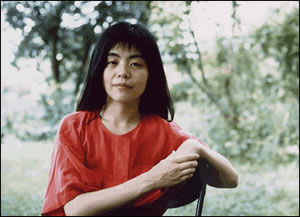
Yōko Tawada (Tokyo, 23 maart 1960)
De Amerikaanse schrijver Steven Saylor werd geboren op 23 maart 1956 in Port Lavaca Texas. Zie alle tagsvoor Steven Saylor op dit blog.
Uit: The Triumph of Caesar
“I heard that you were dead.”
Such a brusque comment from Caesar’s wife might have offended me had I not heard it already from so many others since I returned from Egypt to Rome, where everyone had apparently given me up for dead.
Having sent a slave to summon me, Calpurnia had received me in an elegant but sparsely furnished room in her house not far from mine on the Palatine Hill. There was only one chair. She sat. I stood and tried not to fidget while the most powerful woman in Rome looked me up and down.
“Yes, I’m sure one of my agents told me you drowned in the Nile,” she said, gazing at me shrewdly. “Yet here you stand before me, Gordianus, as alive as ever—unless those Egyptians have learned to bring the dead back to life, not just mummify them.” She fixed her chilly gaze on my face. “How old are you, Finder?”
“Sixty-four.”
“No! Have the Egy
ptians found a way to restore a man’s youth? You look very fit for a man your age. You’re ten years older than my husband, yet I daresay you look ten years younger.”
I shrugged. “Great Caesar carries the weight of the whole world on his shoulders. His enemies have been destroyed, but his responsibilities are greater than ever. The worries and cares of the world’s master must be endless. My humble life has taken a different course. My obligations grow less, not more. I’ve had my share of strife, but now I’m at peace with the world and with myself. For the time being, at least . . .”
Having been summoned by Caesar’s wife, I had to wonder if the tranquillity of my life was about to be sorely disrupted.
“When did I last see you, Gordianus?”
“It must have been almost exactly two years ago, just before I left for Egypt.”
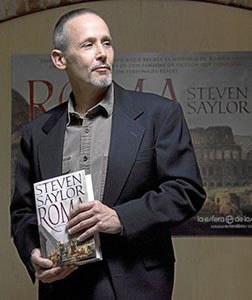
Steven Saylor (Port Lavaca, 23 maart 1956)
De Samische dichter, schilder, musicus en fotograaf Nils-Aslak Valkeapää werd geboren op 23 maart 1943 in Palonjoensuu nabij Enontekiö. Zie alle tags voor Nils-Aslak Valkeapää op dit blog.
Uit: The Sun, my Father
the land
is different
when you have lived there
wandered
sweated
frozen
seen the sun
set rise
disappear return
the land is different
when you know
here are
roots
ancestors
Uit: Trekways of the Wind
Hello my dear friend
Hello again dear sister
hello dear brother
Once again I get to rest in your thoughts
warm myself by the coals of your feelings
Bures bures dear brother
how do you do dear sister
How nice to meet you again
see you
Your eyes shining
Wishing you peace
Awhile, I take refuge with you
open briefly my heart
crawl into your thoughts’ warm embrace
for a short while
give me security
Spread your wings

Nils-Aslak Valkeapää (23 maart 1943 – 26 november 2001)
Zie voor nog meer schrijvers van de 23e maart ook mijn vorige blog van vandaag.


